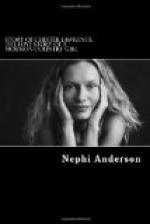They were evidently in Ireland.
“A most noticeable peculiarity of Cork is its absolute want of uniformity, and the striking contrasts in the colors of the houses. The stone of which the houses in the northern suburb is built is of reddish brown, that on the south, of a cold gray tint. Some are constructed of red brick, some are sheathed in slate, some whitewashed; some reddened, some yellowed. Patrick may surely do as he likes with his own house. The most conspicuous steeple in the place, that of St. Ann, Shandon’s, is actually red two sides and white the others,
’Parti-colored, like
the people,
Red and white stands Shandon
steeple.’
and there it is before us,” said Lucy.
The tower loomed from a low, unpretentious church. The two visitors drove up the hill, stopped the horse while they looked at the tower and heard the bells strike the hour.
“What Father Prout could see in such commonplace things to inspire him to write his fine poem, I can not understand,” said Lucy. “There is a peculiar jingle in his lines which stays with one. Listen:
“’With deep affectation
and recollection
I often think
of the Shandon bells,
Whose sounds so wild would,
in days of childhood
Fling round my
cradle their magic spells—
On this I ponder, where’er
I wander,
And thus grow
fonder, sweet Cork of thee
With
thy bells of Shandon,
That
sound so grand on
The pleasant waters
of the river Lee.’”
Lucy read the four stanzas.
“It’s fine,” agreed Chester; “and I think I can answer your question of a moment ago. Father Prout, as he says, listened to these bells in childhood days, those days when ‘heaven lies about us’ and glorifies even the most common places, and the impressions he then received remained with him.”
Lucy “guessed” he was right.
Then they drove by St. Fin Barre’s cathedral, considered the most noteworthy and imposing building in Cork. “’It is thought probable the poet Spenser was married in the church which formerly stood on the site,’” Lucy read. “’His bride was a Cork lady, but of the country, not of the city. Spenser provokingly asks:
“‘Tell me, ye
merchants’ daughters, did ye see
So fayre a creature in your
town before?
Her goodlie eyes, like sapphyres
shining bright;
Her forehead, ivory white,
Her lips like cherries charming
men to byte.’”
“Well,” remarked Chester as they drove homeward, and he thought he was brave in doing so. “I don’t know about the merchants’ daughters of Cork, but I know a minister’s daughter of Kansas City, Missouri, U.S.A., who tallies exactly with Spenser’s description.”
“Why, Mr. Lawrence!”
“I might say more,” he persisted, “were it not for some foolish promises I made that same minister a few days ago—but here we are. Where shall we go after lunch?”




